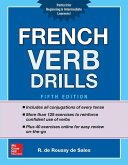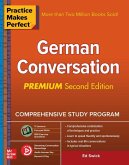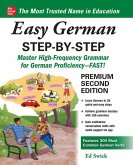Astrid Henschel
German Verb Drills, Fifth Edition
22,99 €
inkl. MwSt.
Versandfertig in 2-4 Wochen

11 °P sammeln
Astrid Henschel
German Verb Drills, Fifth Edition
- Broschiertes Buch
- Merkliste
- Auf die Merkliste
- Bewerten Bewerten
- Teilen
- Produkt teilen
- Produkterinnerung
- Produkterinnerung
This accessible resource provides expert instruction, drills, and interactive exercises to help readers master the conjugation of German verbs.
Andere Kunden interessierten sich auch für
![French Verb Drills, Fifth Edition French Verb Drills, Fifth Edition]() R. de Roussy de SalesFrench Verb Drills, Fifth Edition27,99 €
R. de Roussy de SalesFrench Verb Drills, Fifth Edition27,99 €![German Grammar Drills, Premium German Grammar Drills, Premium]() Ed SwickGerman Grammar Drills, Premium12,99 €
Ed SwickGerman Grammar Drills, Premium12,99 €![Spanish Verb Drills, Premium Sixth Edition Spanish Verb Drills, Premium Sixth Edition]() Vivienne BeySpanish Verb Drills, Premium Sixth Edition16,99 €
Vivienne BeySpanish Verb Drills, Premium Sixth Edition16,99 €![Italian Verb Drills, Premium Fifth Edition Italian Verb Drills, Premium Fifth Edition]() Paola Nanni-TateItalian Verb Drills, Premium Fifth Edition16,99 €
Paola Nanni-TateItalian Verb Drills, Premium Fifth Edition16,99 €![Practice Makes Perfect: German Conversation, Premium Second Edition Practice Makes Perfect: German Conversation, Premium Second Edition]() Ed SwickPractice Makes Perfect: German Conversation, Premium Second Edition30,99 €
Ed SwickPractice Makes Perfect: German Conversation, Premium Second Edition30,99 €![Easy German Step-By-Step, Second Edition Easy German Step-By-Step, Second Edition]() Ed SwickEasy German Step-By-Step, Second Edition16,99 €
Ed SwickEasy German Step-By-Step, Second Edition16,99 €![French Grammar Drills, Premium Fourth Edition French Grammar Drills, Premium Fourth Edition]() Eliane KurbegovFrench Grammar Drills, Premium Fourth Edition17,99 €
Eliane KurbegovFrench Grammar Drills, Premium Fourth Edition17,99 €-
-
-
This accessible resource provides expert instruction, drills, and interactive exercises to help readers master the conjugation of German verbs.
Hinweis: Dieser Artikel kann nur an eine deutsche Lieferadresse ausgeliefert werden.
Hinweis: Dieser Artikel kann nur an eine deutsche Lieferadresse ausgeliefert werden.
Produktdetails
- Produktdetails
- Verlag: McGraw-Hill Education
- 5 ed
- Seitenzahl: 160
- Erscheinungstermin: 28. März 2017
- Englisch
- Abmessung: 274mm x 217mm x 15mm
- Gewicht: 424g
- ISBN-13: 9781260010602
- ISBN-10: 1260010600
- Artikelnr.: 46003806
- Herstellerkennzeichnung
- Libri GmbH
- Europaallee 1
- 36244 Bad Hersfeld
- gpsr@libri.de
- Verlag: McGraw-Hill Education
- 5 ed
- Seitenzahl: 160
- Erscheinungstermin: 28. März 2017
- Englisch
- Abmessung: 274mm x 217mm x 15mm
- Gewicht: 424g
- ISBN-13: 9781260010602
- ISBN-10: 1260010600
- Artikelnr.: 46003806
- Herstellerkennzeichnung
- Libri GmbH
- Europaallee 1
- 36244 Bad Hersfeld
- gpsr@libri.de
McGraw-Hill authors represent the leading experts in their fields and are dedicated to improving the lives, careers, and interests of readers worldwide
Introduction
Part 1 The Present Tense of Regular, Irregular, and Modal Verbs
1 Infinitive
2 Present tense of regular verbs
Interrogative
3 Present tense of haben, sein, and werden
4 Present tense of irregular verbs
Vowel change from e to i
Vowel change from e to ie
Vowel change from a to ä
5 Verbs with separable prefixes in the present tense
Common separable prefixes
6 Modal auxiliaries in the present tense
Review of part 1
Part 2 Imperative, Future Tense, and Present Perfect Tense
7 Imperative
Formal command
Familiar command, singular
Familiar command, plural
Exhortations (mild commands)
8 Future tense
Adverb of time
9 Present perfect tense of weak verbs
Use of tense
Formation of tense
Formation of past participle of weak verbs
10 Haben or sein as the auxiliary verb in perfect tenses
11 Present perfect tense of strong verbs
Formation of past participle
12 Present perfect tense of mixed verbs
13 Present perfect tense with separable prefixes
14 Present perfect tense with inseparable prefixes and verb stems ending in
-ier
Inseparable prefixes
Verb stems ending in -ier
15 Present perfect tense with modal auxiliaries
Review of part 2
Part 3 The Past Tense
16 Use of past tense
17 Past tense of weak verbs
Definition of weak and strong verbs
Formation of weak verbs in the past tense
18 Past tense of strong verbs
19 Past tense of mixed verbs
20 Past tense of haben, sein, and werden
21 Past tense of modal auxiliaries
Review of part 3
Part 4 Perfect Tenses, Reflexive and Impersonal Verbs, Infinitive
Constructions, and Passive Voice
22 Past perfect tense
Use of tense
Formation of tense
23 Future perfect tense
Use of tense
Formation of tense
24 Reflexive verbs
Use of the reflexive
Formation of reflexive construction
Perfect tenses of reflexive verbs
Use of the dative with personal interest
Reflexive commands
25 Impersonal verbs
Es gibt or es ist, es sind
26 Infinitive constructions
Verbal nouns
Double infinitives with modals
Double infinitives with lassen, helfen, sehen, etc.
Infinitives without zu
Infinitives with or without zu
Infinitives with zu
Prepositions and infinitives
Infinitives and commands
27 The passive voice
Formation of the passive voice
Von or durch
Conjugation of passive voice
Man as a substitute
Passive with modal auxiliaries
Review of part 4
Part 5 The Subjunctive and Conditional Moods
28 Formation of the subjunctive mood
Simple tenses
Compound tenses
29 Use of the subjunctive-expressing a wish
Use of the subjunctive
Subjunctive in expressing a wish
30 Subjunctive after als ob or als wenn
Present
Past
Omission of ob or wenn
31 Conditional
Use of the conditional
Formation of the conditional
32 Unreal conditions (subjunctive or conditional)
Present
Past
Omission of wenn
33 Indirect discourse with the subjunctive and the indicative
Indirect discourse with the subjunctive
Indirect discourse with the indicative
Review of part 5
Appendix: Final Review
Answer Key
Index of Verbs
German-English
English-German
Part 1 The Present Tense of Regular, Irregular, and Modal Verbs
1 Infinitive
2 Present tense of regular verbs
Interrogative
3 Present tense of haben, sein, and werden
4 Present tense of irregular verbs
Vowel change from e to i
Vowel change from e to ie
Vowel change from a to ä
5 Verbs with separable prefixes in the present tense
Common separable prefixes
6 Modal auxiliaries in the present tense
Review of part 1
Part 2 Imperative, Future Tense, and Present Perfect Tense
7 Imperative
Formal command
Familiar command, singular
Familiar command, plural
Exhortations (mild commands)
8 Future tense
Adverb of time
9 Present perfect tense of weak verbs
Use of tense
Formation of tense
Formation of past participle of weak verbs
10 Haben or sein as the auxiliary verb in perfect tenses
11 Present perfect tense of strong verbs
Formation of past participle
12 Present perfect tense of mixed verbs
13 Present perfect tense with separable prefixes
14 Present perfect tense with inseparable prefixes and verb stems ending in
-ier
Inseparable prefixes
Verb stems ending in -ier
15 Present perfect tense with modal auxiliaries
Review of part 2
Part 3 The Past Tense
16 Use of past tense
17 Past tense of weak verbs
Definition of weak and strong verbs
Formation of weak verbs in the past tense
18 Past tense of strong verbs
19 Past tense of mixed verbs
20 Past tense of haben, sein, and werden
21 Past tense of modal auxiliaries
Review of part 3
Part 4 Perfect Tenses, Reflexive and Impersonal Verbs, Infinitive
Constructions, and Passive Voice
22 Past perfect tense
Use of tense
Formation of tense
23 Future perfect tense
Use of tense
Formation of tense
24 Reflexive verbs
Use of the reflexive
Formation of reflexive construction
Perfect tenses of reflexive verbs
Use of the dative with personal interest
Reflexive commands
25 Impersonal verbs
Es gibt or es ist, es sind
26 Infinitive constructions
Verbal nouns
Double infinitives with modals
Double infinitives with lassen, helfen, sehen, etc.
Infinitives without zu
Infinitives with or without zu
Infinitives with zu
Prepositions and infinitives
Infinitives and commands
27 The passive voice
Formation of the passive voice
Von or durch
Conjugation of passive voice
Man as a substitute
Passive with modal auxiliaries
Review of part 4
Part 5 The Subjunctive and Conditional Moods
28 Formation of the subjunctive mood
Simple tenses
Compound tenses
29 Use of the subjunctive-expressing a wish
Use of the subjunctive
Subjunctive in expressing a wish
30 Subjunctive after als ob or als wenn
Present
Past
Omission of ob or wenn
31 Conditional
Use of the conditional
Formation of the conditional
32 Unreal conditions (subjunctive or conditional)
Present
Past
Omission of wenn
33 Indirect discourse with the subjunctive and the indicative
Indirect discourse with the subjunctive
Indirect discourse with the indicative
Review of part 5
Appendix: Final Review
Answer Key
Index of Verbs
German-English
English-German
Introduction
Part 1 The Present Tense of Regular, Irregular, and Modal Verbs
1 Infinitive
2 Present tense of regular verbs
Interrogative
3 Present tense of haben, sein, and werden
4 Present tense of irregular verbs
Vowel change from e to i
Vowel change from e to ie
Vowel change from a to ä
5 Verbs with separable prefixes in the present tense
Common separable prefixes
6 Modal auxiliaries in the present tense
Review of part 1
Part 2 Imperative, Future Tense, and Present Perfect Tense
7 Imperative
Formal command
Familiar command, singular
Familiar command, plural
Exhortations (mild commands)
8 Future tense
Adverb of time
9 Present perfect tense of weak verbs
Use of tense
Formation of tense
Formation of past participle of weak verbs
10 Haben or sein as the auxiliary verb in perfect tenses
11 Present perfect tense of strong verbs
Formation of past participle
12 Present perfect tense of mixed verbs
13 Present perfect tense with separable prefixes
14 Present perfect tense with inseparable prefixes and verb stems ending in
-ier
Inseparable prefixes
Verb stems ending in -ier
15 Present perfect tense with modal auxiliaries
Review of part 2
Part 3 The Past Tense
16 Use of past tense
17 Past tense of weak verbs
Definition of weak and strong verbs
Formation of weak verbs in the past tense
18 Past tense of strong verbs
19 Past tense of mixed verbs
20 Past tense of haben, sein, and werden
21 Past tense of modal auxiliaries
Review of part 3
Part 4 Perfect Tenses, Reflexive and Impersonal Verbs, Infinitive
Constructions, and Passive Voice
22 Past perfect tense
Use of tense
Formation of tense
23 Future perfect tense
Use of tense
Formation of tense
24 Reflexive verbs
Use of the reflexive
Formation of reflexive construction
Perfect tenses of reflexive verbs
Use of the dative with personal interest
Reflexive commands
25 Impersonal verbs
Es gibt or es ist, es sind
26 Infinitive constructions
Verbal nouns
Double infinitives with modals
Double infinitives with lassen, helfen, sehen, etc.
Infinitives without zu
Infinitives with or without zu
Infinitives with zu
Prepositions and infinitives
Infinitives and commands
27 The passive voice
Formation of the passive voice
Von or durch
Conjugation of passive voice
Man as a substitute
Passive with modal auxiliaries
Review of part 4
Part 5 The Subjunctive and Conditional Moods
28 Formation of the subjunctive mood
Simple tenses
Compound tenses
29 Use of the subjunctive-expressing a wish
Use of the subjunctive
Subjunctive in expressing a wish
30 Subjunctive after als ob or als wenn
Present
Past
Omission of ob or wenn
31 Conditional
Use of the conditional
Formation of the conditional
32 Unreal conditions (subjunctive or conditional)
Present
Past
Omission of wenn
33 Indirect discourse with the subjunctive and the indicative
Indirect discourse with the subjunctive
Indirect discourse with the indicative
Review of part 5
Appendix: Final Review
Answer Key
Index of Verbs
German-English
English-German
Part 1 The Present Tense of Regular, Irregular, and Modal Verbs
1 Infinitive
2 Present tense of regular verbs
Interrogative
3 Present tense of haben, sein, and werden
4 Present tense of irregular verbs
Vowel change from e to i
Vowel change from e to ie
Vowel change from a to ä
5 Verbs with separable prefixes in the present tense
Common separable prefixes
6 Modal auxiliaries in the present tense
Review of part 1
Part 2 Imperative, Future Tense, and Present Perfect Tense
7 Imperative
Formal command
Familiar command, singular
Familiar command, plural
Exhortations (mild commands)
8 Future tense
Adverb of time
9 Present perfect tense of weak verbs
Use of tense
Formation of tense
Formation of past participle of weak verbs
10 Haben or sein as the auxiliary verb in perfect tenses
11 Present perfect tense of strong verbs
Formation of past participle
12 Present perfect tense of mixed verbs
13 Present perfect tense with separable prefixes
14 Present perfect tense with inseparable prefixes and verb stems ending in
-ier
Inseparable prefixes
Verb stems ending in -ier
15 Present perfect tense with modal auxiliaries
Review of part 2
Part 3 The Past Tense
16 Use of past tense
17 Past tense of weak verbs
Definition of weak and strong verbs
Formation of weak verbs in the past tense
18 Past tense of strong verbs
19 Past tense of mixed verbs
20 Past tense of haben, sein, and werden
21 Past tense of modal auxiliaries
Review of part 3
Part 4 Perfect Tenses, Reflexive and Impersonal Verbs, Infinitive
Constructions, and Passive Voice
22 Past perfect tense
Use of tense
Formation of tense
23 Future perfect tense
Use of tense
Formation of tense
24 Reflexive verbs
Use of the reflexive
Formation of reflexive construction
Perfect tenses of reflexive verbs
Use of the dative with personal interest
Reflexive commands
25 Impersonal verbs
Es gibt or es ist, es sind
26 Infinitive constructions
Verbal nouns
Double infinitives with modals
Double infinitives with lassen, helfen, sehen, etc.
Infinitives without zu
Infinitives with or without zu
Infinitives with zu
Prepositions and infinitives
Infinitives and commands
27 The passive voice
Formation of the passive voice
Von or durch
Conjugation of passive voice
Man as a substitute
Passive with modal auxiliaries
Review of part 4
Part 5 The Subjunctive and Conditional Moods
28 Formation of the subjunctive mood
Simple tenses
Compound tenses
29 Use of the subjunctive-expressing a wish
Use of the subjunctive
Subjunctive in expressing a wish
30 Subjunctive after als ob or als wenn
Present
Past
Omission of ob or wenn
31 Conditional
Use of the conditional
Formation of the conditional
32 Unreal conditions (subjunctive or conditional)
Present
Past
Omission of wenn
33 Indirect discourse with the subjunctive and the indicative
Indirect discourse with the subjunctive
Indirect discourse with the indicative
Review of part 5
Appendix: Final Review
Answer Key
Index of Verbs
German-English
English-German







